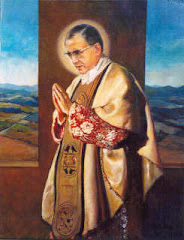I work in a parish that is run by the Prelature of Opus Dei. I am not a numerary, supernumerary or a cooperator but I have developed a great respect for the Prelature based simply on the reverence that they have for the Blessed Sacrament and their total obedience to the Holy Father. I have, for just over a year now, attended their monthly Recollections at which one listens to a reading from one of St Josemaria's works (which are excellent, by the way), one is given a meditation by an Opus Dei priest, one is allowed time to make an examination of conscience and is given the opportunity to go to confession and then one listens to a talk on a particular spiritual topic by an Opus Dei numerary. The Recollection then comes to a close with a Benediction of the Blessed Sacrament which I always find quite beautiful. At NO time have I ever been pushed or forced to do anything by anyone in Opus Dei. If you read some of the 'testimonials' of ex-numeraries and supernumeraries you would swear that you are dealing with the Catholic version of 'the Moonies'. All I can say is that if one does come across such things, one should read such them with a great deal of common sense and discernment, especially if you have had no previous contact with Opus Dei. There are also always two sides to a story.
Have people had bad experiences with Opus Dei? Of course, I have no doubt of that. That is simply life. No religious Order or Association is perfect because it is peopled by human beings who are weak and given to error. How many of the saints were badly treated by members of their own order? St John of the Cross, St Margaret Mary and St Faustina are just a few who immediately spring to mind. In the end, no matter which Order they belonged to, their sole (soul?) focus was Christ and not their own particular wants, needs or opinions.
Make no mistake, Opus Dei is totally oriented towards Christ and the Church and I am thoroughly tired of people who call them the "Catholic Mafia" or "fanatics". If being loyal to the Holy See makes you a 'fanatic', then God help Catholicism.
I would like to end with a quote from St Josemaria Escriva's The Forge which I have always found inspiring:
39. I see myself like a poor little bird, accustomed only to making short flights from tree to tree, or, at most, up to a third floor balcony… One day in its life it succeeded in reaching the roof of a modest building, that you could hardly call a skyscraper.
But suddenly our little bird is snatched up by an eagle, who mistakes the bird for one of its own brood. In its powerful talons the bird is borne higher and higher, above the mountains of the earth and the snow—capped peaks, above the white, blue and rose—pink clouds, and higher and higher until it can look right into the sun. And then the eagle lets go of the little bird and says: Off you go. Fly!
—Lord, may I never flutter again close to the ground. May I always be enlightened by the rays of the divine sun — Christ — in the Eucharist. May my flight never be interrupted until I find repose in your Heart.





